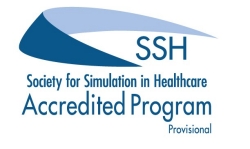SLRC Earns Provisional Accreditation from SSH

The Simulation and Learning Resource Center (SLRC) of the Villanova University M. Louise Fitzpatrick College of Nursing (FCN), learned on October 7 that it has achieved Provisional Accreditation from the Society of Simulation in Healthcare (SSH). Provisional Accreditation is granted for two years and allows simulation programs to seek accreditation earlier by focusing on the structure and processes to accredit those aspects of the applying program.
By receiving SSH Provisional Accreditation, the SLRC demonstrates compliance with Core Standards and Teaching/Education Standards. The SLRC will be eligible for full accreditation in 2024 by demonstrating two years of programmatic outcomes in addition to continued compliance with SSH’s Core Standards and Teaching/Education Standards. Of the 642 simulation centers listed in the SSH directory, only 134 are accredited (14 are colleges of nursing) and 44 are provisionally accredited (7 are colleges of nursing); the latter category includes Columbia School of Nursing and University of San Francisco School of Nursing and Health Professions.
The effort was spearheaded by SLRC Executive Director Gail Furman, PhD, RN, CHSE, clinical professor, Patricia Prieto, BSN, RN, MBA, CHSE, SLRC associate director, and Professor Bette Mariani, PhD, RN, ANEF, FAAN, vice dean for Academic Affairs
“We are thrilled to achieve this milestone towards becoming fully accredited by the SSH. This provisional accreditation validates our simulation program through SSH’s rigorous peer review process,” said Dr. Furman. The benefits of accreditation accrue value to the organization, the industry and the community. Benefits include but are not limited to improving healthcare education, patient safety efforts, and recognition of expertise in simulation above and beyond domain expertise.
SSH’s website describes its purpose as serving “a global community of practice enhancing the quality of healthcare.” Through simulation, its goal is to “improve performance and reduce errors in patient care.” Members of SSH include “nurses, physicians, allied health and paramedical personnel, researchers, educators and developers from around the globe.”
